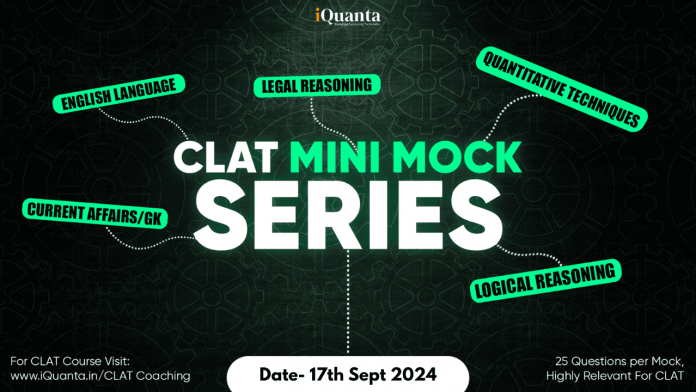iQuanta has launched a Mini Mock Series covering all the sections of the CLAT exam, these questions have been handpicked by our faculty based on the latest CLAT exam pattern.
Instructions:-
1. Attempt all the questions.
2. Once you have completed all the questions of a particular section click on the submit button for scores and explanations then move to the next sections.
3. For each correct answer, you receive 1 mark. For this mock, there is no negative marking.
English Language
Each set of questions in this section is based on a single passage. Please answer each question on the basis of what is stated or implied in the corresponding passage. In some instances, more than one option may be the answer to the question; in such a case, please choose the option that most accurately and comprehensively answers the question.
It was spring, a day on which the fresh grain was fried and eaten and given as a gift. No fire was lit in the houses Bhungi’s oven was being put to good use today. There was a crowd worthy of a village fair around her. She had scarcely opportunity to draw a breath. Because of the customer’s impatience, squabbles kept breaking out. Then two servants arrived, each carrying a heaped basket of grain from Pandit Udaybhan with the order to parch it right away. When Bhungi saw the two baskets she was alarmed. It was already after twelve and even by sunset, she would not have time to parch so much grain. Now she would have to stay at the oven parching until after dark for no payment. In despair she took the two baskets. One of the flunkeys said
menacingly, ‘Don’t waste any time or you’ll be sorry.’ With this command the servants went away and Bhungi began to parch the grain. It’s no laughing matter to parch a whole maund of grain. She had to
keep stopping from the parching in order to keep the oven fire going. So by sundown not even half the work was done. She was afraid Panditji’s men would be coming. She began to move her hands all the more frantically. Soon the servants returned and said, ‘Well, is the grain parched?’ Feeling bold, Bhungi said, ‘Can’t you see? I’m parching it now.’ ‘The whole day’s gone and you haven’t finished any more grain than this! Have you been roasting it or spoiling it? This is completely uncooked! How’s it going to be used for food? It’s the ruin of us! You’ll see what Panditji does to you for this.’ The result was that that night the oven was dug up and Bhungi was left without a means of livelihood. Bhungi now had no means of support. The villagers suffered a good deal too from the destruction of the oven. In many houses even at noon, cooked cereal was no longer available. People went to Panditji and asked him to give the order for the old woman’s oven to be rebuilt and the fire once more lighted, but he paid no attention to them. He could not suffer a loss of face. A few people who wished her well urged her to move to another village. But her heart would not accept this suggestion. She had spent her fifty miserable years in this village and she loved every leaf on every tree. Here she had known the sorrows and pleasures of life; she could not give it up now in the last days. The very idea of moving distressed her. Sorrow in this village was preferable to happiness in another.
Quantitative Techniques
Logical Reasoning
Directions: Read the passage and answer the following question.
The Centre has officially notified amendments in the Central Goods and Services Tax (CGST) and Integrated Goods and Services Tax (IGST) for online gaming companies. These amendments, passed by the Lok Sabha on August 11 and recommended by the GST Council, will be effective from October 1. The amendments stipulate that all gaming companies based outside India providing service via intermediary are mandated to register themselves and deduct tax at source.
The notification specifies that every person liable to be registered under sub-section (1) of section 25 and every person seeking registration under sub-section (3) of section 25, except non-resident taxable persons; persons required to deduct tax at source under section 51; persons required to collect tax at source under section 52; and persons supplying online information and database access or retrieval services from a place outside India to a non-taxable online recipient referred to in section 14 or a person supplying online money gaming from a place outside India to a person in India referred to in section 14A under the Integrated Goods and Services Tax Act, 2017, shall declare his Permanent Account Number, State or Union territory before applying for registration.
The government also mandates online gaming companies to maintain a user database and file GST returns. The primary objective of these legislative modifications is to implement a 28% GST for online gaming, casinos, and horse racing. The GST Council decided to swiftly amend the applicable Acts and levy taxes on these areas in its 51st meeting on August 2. The government asserts that these reforms will introduce much-needed transparency to the taxation of supply in horse racing, casinos, and internet gambling. These changes are significant as they aim to bring clarity and structure to the taxation process related to online gaming and related services, ensuring that companies operating in these sectors are compliant with the tax regulations in India. The enforcement of these amendments underscores the government’s commitment to regulating the online gaming industry and ensuring compliance with tax obligations, thereby contributing to the nation’s economic framework.
Legal Reasoning
Directions: Read the passage and answer the following question.
Sections 23 and 24 of the Indian Contract Act, 1872, delineate the boundaries of lawful and unlawful considerations within contractual agreements, thereby shaping the enforceability and validity of contracts. Section 23 defines what constitutes illegal consideration, while Section 24 explicitly renders contracts involving such considerations void. A contract is deemed to have an illegal consideration if it includes any element that is forbidden by law, or if its nature is such that, if permitted, it would defeat the provisions of any law. Additionally, considerations that are fraudulent, involve or imply injury to the person or property of another, or are deemed immoral or opposed to public policy by the Court, are also classified as illegal under Section 23.
The principle of public policy, although not exhaustively defined, encompasses several broad categories of agreements that are deemed contrary to the public good. Trading with an enemy nation, for instance, is opposed to public policy as it undermines national security and interests. Similarly, trafficking in public office, which involves the buying and selling of public positions, is considered a serious breach of public trust and integrity. Maintenance and champerty—wherein a third party supports litigation in exchange for a share of the proceeds—are also seen as contrary to public policy due to their potential to encourage frivolous or malicious lawsuits.
Marriage brokerage agreements, where a broker is paid for arranging a marriage, fall under the scope of immorality and public policy violations. Such agreements commodify marital relationships and undermine the sanctity and personal nature of marriage. Unconscionable bargains, characterized by terms that are excessively unfair or oppressive to one party, are likewise considered opposed to public policy because they exploit power imbalances and can lead to significant harm or injustice.
When a contract includes both legal and illegal considerations, the principle of severability comes into play. This principle aims to salvage the valid portions of the contract by severing the illegal parts, thereby allowing the contract to be partially enforced to the extent that it remains lawful. The doctrine of severability is applied to maximize the performance and enforceability of the contract while ensuring that the illegal components do not taint the entire agreement. Courts strive to uphold the portions of the contract that comply with legal standards and public policy, provided that the legal and illegal parts can be clearly separated.
However, in cases where the illegal consideration forms an inseparable part of the contract or where the illegal element taints the contract’s core purpose, the entire contract may be deemed void. The application of the severability principle is thus contingent on the ability to distinguish and separate the lawful elements from the unlawful ones without fundamentally altering the contract’s nature or intent.
In summary, Sections 23 and 24 of the Indian Contract Act, 1872, provide a framework for identifying and dealing with illegal considerations within contracts. They highlight the importance of legality and public policy in contractual agreements, ensuring that contracts do not promote or condone illegal or immoral activities. The principle of severability serves as a remedial measure to uphold the lawful aspects of contracts while discarding the illegal components, thereby preserving the integrity and enforceability of contractual obligations to the extent possible within the bounds of law.
Current Affairs & General Knowledge
The Karnataka High Court on Tuesday dismissed a public interest litigation (PIL) petition that challenged a bill recently introduced by the Karnataka government to reserve 50 to 75 per cent of private sector jobs for Kannadigas [Dr. Amirthalakshmi R v. State of Karnataka and ors].
The Court refused to entertain the petition after noting that the bill was yet to be enacted into law. The Court, therefore, termed the petition premature and dismissed it on this ground alone, without expressing any opinion on the merits of such a challenge. The bill in focus is being mooted to provide reservations for locals under the Kannadiga quota in private sector jobs including “industries, factories, and other establishments” in Karnataka. The bill, styled Karnataka State Government Employment of Local Candidates in Industries Bill, 2024 mandates 50 per cent reservation for locals in managerial positions and [1] per cent in non-managerial posts. After controversy arose over this move, Karnataka Chief Minister Siddaramaiah clarified through a July 17 post on X (formerly Twitter) that the bill is still in its preparation stage and that a comprehensive discussion will be held at the next cabinet meeting before a final decision is made. The petitioner before the High Court had called for the withdrawal of the bill until constitutional challenges arising from such a move were framed by the Court and resolved. As an interim prayer, the petitioner had urged the Court to restrain the State from enacting the bill. The counsel added that the Kannadiga Quota bill may go against the intent of providing benefits for local candidates as well.
However, the Court did not hear detailed submissions. After examining the case papers, the Bench proceeded to dismiss the petition as premature.
“It was a legislative enactment that was challenged before the Punjab and Haryana High Court … (Bill) has not assumed the character of law. The petition is currently premature. On the aforesaid ground alone, without going into the merits of the contentions of petitioner and without expressing any opinion on merits … petition is dismissed,” the Court said.
Enroll for CLAT Online Coaching by iQuanta




